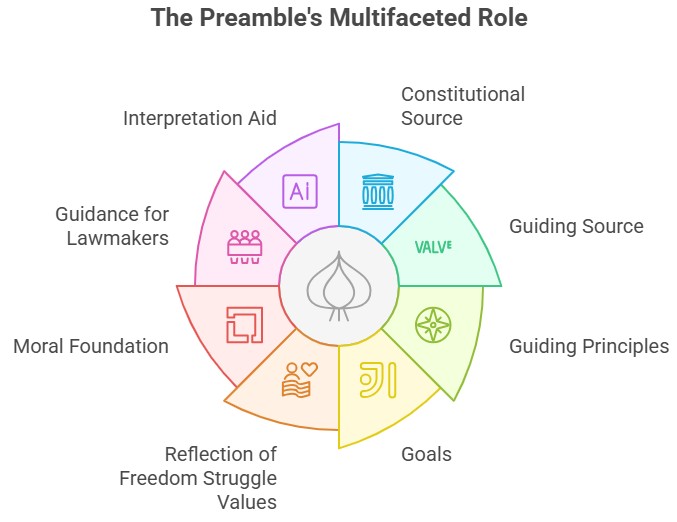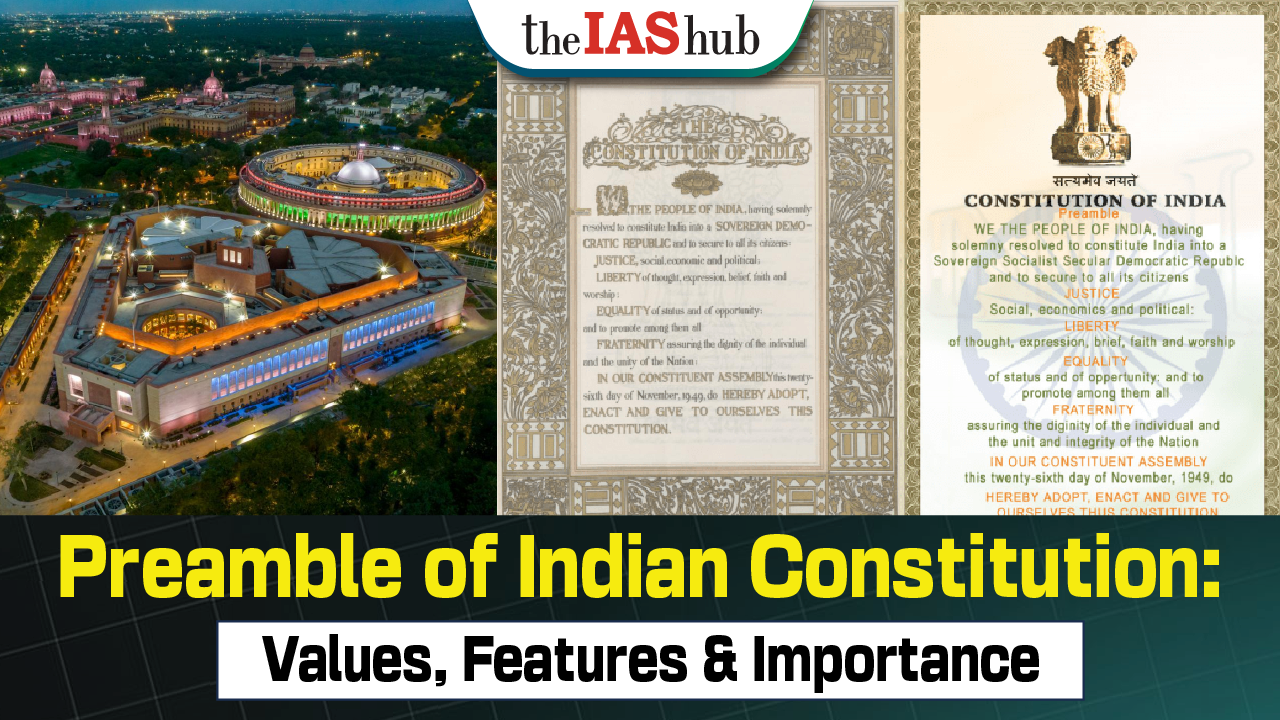Preamble of the Constitution of India is an introductory statement that lays out the fundamental principles and goals of the Constitution. It reflects the aspirations and values of the Indian people and provides a guiding framework for interpreting and implementing the Constitution.
Important Aspects of the Preamble
Sovereign: Sovereignty refers to the independent authority of a state, free from external control. It includes internal sovereignty (lawmaking) and external sovereignty (territory).
- Example: Amid China's military expansion, PM Modi reaffirmed India's commitment to protect sovereignty and promote peaceful resolution of maritime disputes based on international law.
Socialist: Inserted by 42nd Amendment Act in 1976, the term "Socialist" made explicit the implicit ideals of socialism already present in the Constitution.
- Indian socialism advocates a mixed economy with coexistence of public and private sectors.
- Example: Providing all people food security, universal access to education, health and housing. To provide them, government has implemented various initiatives such as MGNREGA, Ayushman Bharat Yojana etc.
- In the case of D.S. Nakara v. Union of India (1983), the Supreme Court held that the primary objective of a socialist state is to eradicate inequality in income, status, and the standard of living.
- Regarding the inclusion of 'socialist,' Dr B.R. Ambedkar argued in Constituent Assembly debates that it goes against the essence of democracy to decide within the Constitution the type of society in which the people of India should live.
Secular: In India, a secular state implies equal protection of all religions by the State. It was incorporated into the Constitution through the 42nd Amendment Act in 1976.
- Fundamental Rights (Articles 14, 15, 16, 25, 26, 27, 28, 29, and 30) safeguard individual and collective religious rights.
- The Directive Principles of State Policy include Article 44, which promotes the concept of a Uniform Civil Code.
- Example: India has no state religion.
- Dr B.R. Ambedkar reasoned in Constituent Assembly debates that the term 'secular' was unnecessary in the Preamble because the entire Constitution embodied the concept of a secular state.
|
Democratic:
- Democracy can be thought of as "power of the people" and the term "Democratic" signifies that the government derives its authority from the will of the people expressed through elections.
- The Preamble of the Constitution encompasses political, economic, and social democracy.
- Example: Recently, the White House dismissed concerns about the health of democracy in India, stating that India is a vibrant democracy that is evident to anyone visiting New Delhi.
|
Republic:
- In a republic, the head of state is elected by the people, either directly or indirectly.
- It ensures that all public offices are accessible to every citizen without discrimination.
- Example: President in India is elected by people indirectly.
|
|
Justice:
- It promises to ensure basic rights such as food, clothing, housing, participation in decision-making, etc.
- The Preamble of the Indian Constitution covers the dimensions of social, economic, and political justice.
- Social: Promotes equal status and opportunities. Examples: PMAGY, SMILE etc.
- Economic: Ensures equitable wealth distribution. Examples: Minimum Wages Act.
- Political Justice: Guarantees equal political rights. Examples: Universal suffrage, equal value of each vote.
|
Liberty:
- It signifies the absence of restrictions on individual actions and the provision of opportunities for personal development.
- Liberty is safeguarded through the fundamental rights enshrined in the Constitution.
- Example: Amendments to Information Technology Rules (April 2023) combat fake news and misinformation online but raise concerns over freedom of expression and civil liberties.
|
Equality:
- It signifies the absence of privileges or discrimination within society.
- The Constitution of India aims to establish social, economic, and political equality across the nation.
- Example: Recently, the Supreme Court started hearing petitions from lesbian, gay, bisexual, transgender and queer (LGBTQ+) petitioners seeking same-sex marriage equality.
|
Fraternity:
- Fraternity means a sense of common brotherhood of all Indians — if Indians being one people.
- It is the principle which gives unity and solidarity to social life.
- Example: In ‘AIIMS Students’ Union V. AIIMS’, the court observed that the Preamble to the Constitution of India secures as one of its objects “fraternities” assuring the dignity of the individual and the unity and integrity of the nation to “we the people of India”.
Importance of the Preamble
- Constitutional Source: It represents the origin of the Constitution, reflecting the authority of the Indian people.
- Guiding Source: It embodies the fundamental values and aspirations of the Constitution's creators, serving as a guiding philosophy.
- Guiding Principles: It serves as a compass, providing guiding principles for the Constitution and influencing the formulation of Fundamental Rights and Directive Principles of State Policy.
- Goals: The Preamble declares the objective of establishing India as a Sovereign Democratic Republic, committed to achieving justice, liberty, equality, and fraternity for all its citizens.
- Reflection of Freedom Struggle Values: It serves as a reminder of the values that guided the freedom struggle and their relevance to the present generation.
- Represents Moral Foundation of Free India: It signifies India's intent for humanitarian values rather than materialistic achievements.
- Guidance for Lawmakers: It acts as a constant reminder for lawmakers and policymakers while formulating legislation and public policies.
- Interpretation Aid: It helps interpret ambiguous language in Articles of the Constitution.

Whether Preamble can be amended?
- Berubari Union Case (1960): The Supreme Court (SC) ruled that the Preamble cannot be considered as a part of the Constitution and therefore cannot be amended.
- Kesavananda Bharati Case (1973):SC clarified that the Preamble is indeed a part of the Constitution and can be amended, as long as it does not violate the basic structure of the Constitution.
- Union Government Vs LIC of India Case (1995): SC reaffirmed that the Preamble is an integral part of the Constitution, but its provisions are not directly enforceable in court.
- Private member Bill in 2021: Former Minister KJ Alphons introduced a bill in Rajya Sabha to amend the Indian Constitution's preamble, seeking to replace "socialist" with "equitable" and make other changes.
- The bill aims to promote a more inclusive and fair society.
Amendments Made to the Preamble
- 42nd Amendment Act (1976): The Preamble was amended only once to include the terms Socialist, Secular, and Integrity.
- Plea Filed to Remove 'Socialist' and 'Secular' from Indian Constitution's Preamble:
- Allegations in the Plea: It is argued to violate the principles of freedom of speech and expression (Article 19(1)(a)) and the right to freedom of religion (Article 25).
- The plea suggests that the concept of 'Dharma' is distinct from the notion of religion in India and that the socialist and secular terms are not in harmony with India's religious sentiments and socio-economic conditions.
Conclusion
- The Preamble of the Indian Constitution, as a guiding light, reflects the core values and aspirations of the people. The initiative by the Karnataka government to teach the preamble to students emphasizes the importance of understanding and embracing the principles that shape the nation's identity.












